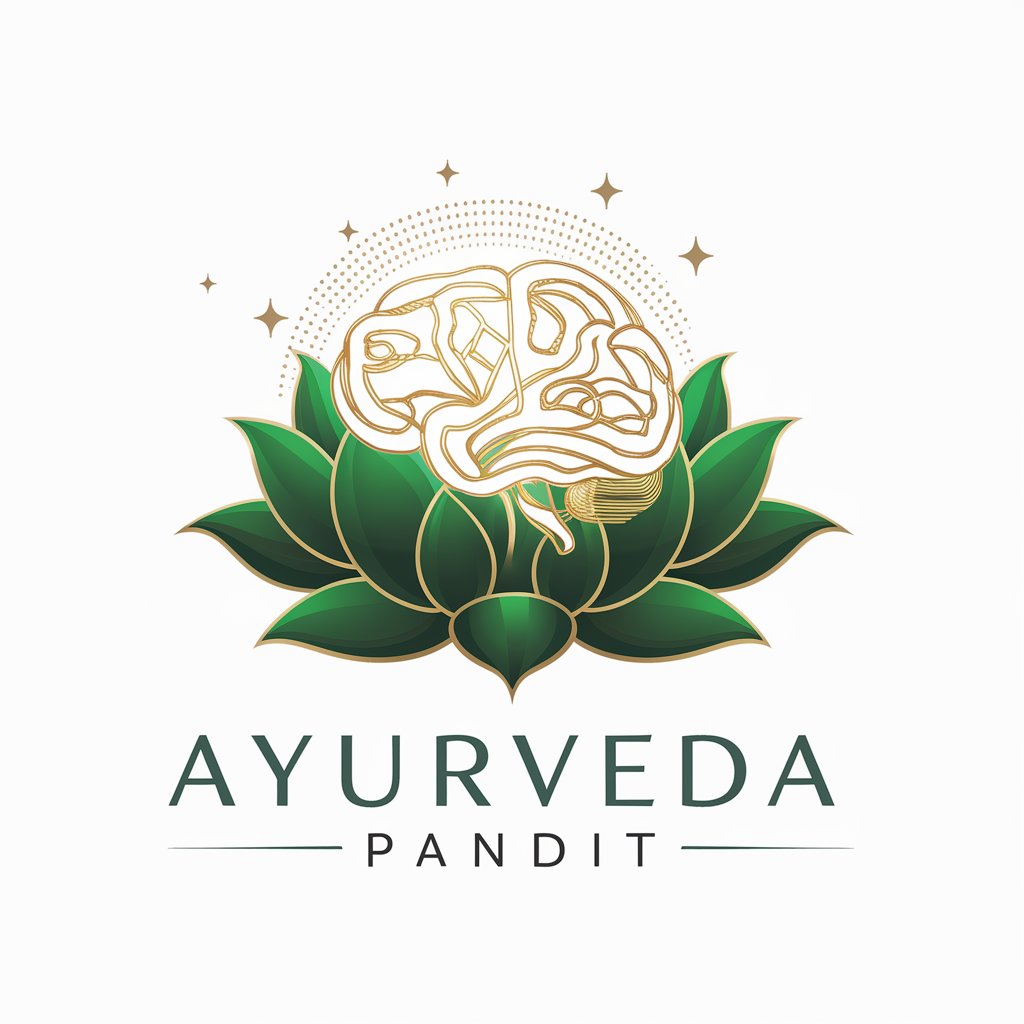
Ayurveda - Ayurvedic Insight and Advice

Welcome to Ayurveda, your guide to holistic well-being.
Empowering Wellness with Ayurvedic Intelligence
Explain the principles of Ayurveda and how they apply to daily life.
What are the best Ayurvedic practices for maintaining digestive health?
Describe the three doshas and how they influence health.
How can Ayurveda help in managing stress and anxiety?
Get Embed Code
Introduction to Ayurveda
Ayurveda, often referred to as the 'Science of Life,' is an ancient holistic healing system that originated in India more than 5,000 years ago. It is based on the premise that health and wellness depend on a delicate balance between the mind, body, and spirit. Ayurveda's fundamental approach is to promote good health, rather than fight disease, through personalized treatments including diet, herbal remedies, exercise, meditation, yoga, and lifestyle adjustments. A key aspect of Ayurveda is the concept of the doshas (Vata, Pitta, Kapha), which are energies believed to circulate in the body and govern physiological activity. An imbalance in these doshas can lead to disease. Examples of Ayurvedic application include dietary adjustments to balance doshas, detoxification treatments like Panchakarma, and the use of herbal medicines to treat specific health issues. Powered by ChatGPT-4o。

Main Functions of Ayurveda
Dosha Balance
Example
Identifying an individual's dominant dosha and recommending specific dietary and lifestyle changes to maintain balance.
Scenario
A person with a Pitta imbalance experiencing inflammation and acidity might be advised to consume cooling foods and practice stress-reduction techniques.
Detoxification (Panchakarma)
Example
Guiding patients through a series of cleansing practices designed to eliminate toxins from the body.
Scenario
Someone undergoing Panchakarma might receive therapeutic vomiting, purgation, enema, nasal administrations, and bloodletting therapies under strict supervision to cleanse the body.
Herbal Remedies
Example
Prescribing herbal formulations to treat or prevent health issues.
Scenario
A person with insomnia may be prescribed an herbal mixture containing Ashwagandha to promote restful sleep.
Dietary Recommendations
Example
Offering tailored diet plans based on doshic imbalances and specific health conditions.
Scenario
An individual with a Kapha dominance might be advised to follow a light, warm, and dry diet to counteract sluggishness and weight gain.
Lifestyle Adjustments
Example
Advising on daily and seasonal routines to align the individual's lifestyle with natural rhythms for optimal health.
Scenario
Recommending a Vata-balancing routine that includes waking up early, performing oil massage (Abhyanga), and practicing yoga to stabilize energy.
Ideal Users of Ayurveda Services
Individuals Seeking Holistic Health Approaches
People interested in comprehensive wellness practices that address physical, mental, and spiritual health, looking beyond conventional medicine to prevent and treat diseases.
Those with Chronic Health Conditions
Individuals dealing with long-term issues such as digestive disorders, arthritis, or anxiety, which have not been effectively managed by conventional treatments, may find relief through personalized Ayurvedic therapies.
Wellness Enthusiasts
People passionate about maintaining their health through natural means, including diet, herbs, and lifestyle adjustments, often turn to Ayurveda for its comprehensive and preventive health care approach.
Patients Seeking Personalized Care
Those who prefer a health care approach tailored to their unique constitution (Prakriti) and current state of health (Vikriti), offering customized treatments rather than a one-size-fits-all solution.

How to Use Ayurveda
Start Your Journey
Begin by exploring Ayurveda through a free trial at yeschat.ai, which requires no login or subscription to ChatGPT Plus, making it accessible and straightforward for newcomers.
Understand Your Dosha
Identify your dosha (Vata, Pitta, Kapha) by taking a comprehensive quiz or consultation with an Ayurvedic practitioner. Understanding your dosha is crucial for personalizing your Ayurvedic journey.
Incorporate Ayurvedic Diet
Adapt your diet according to your dosha, focusing on foods that balance your unique body type. Incorporate six tastes (sweet, sour, salty, bitter, pungent, astringent) in every meal for optimal digestion.
Adopt Daily Routines
Establish a daily Ayurvedic routine, including practices like yoga, meditation, and self-massage with appropriate oils. These routines enhance physical and mental well-being, aligning with nature's rhythms.
Monitor and Adjust
Regularly assess the impact of your Ayurvedic practices on your health and well-being. Be prepared to adjust your diet, routines, and herbal supplements as your life circumstances and seasons change.
Try other advanced and practical GPTs
Paul Graham Bot
Insights from Paul Graham, powered by AI

Criogenia y gases
Unlocking the cold power of cryogenics with AI

ChordsVault
Empowering musicians with AI-driven music tools.

Emily from Anime Club
Engage with your anime companion

Fast Track F1
Revolutionizing Formula 1 Learning with AI

Book Crafter
Empowering Your Words with AI

Estratega MKT
Empowering Your Digital Marketing Success

TeachMate
Empowering Teachers with AI

Travel Buddy ZE
Your AI-Powered Journey Navigator

GreenTech Advisor
Empowering eco-conscious businesses with AI

版权自由导航
Discover free video content with AI-powered search.

自炊ヘルパー
Empowering your kitchen with AI

Ayurveda Q&A
What is Ayurveda?
Ayurveda, often referred to as the 'Science of Life,' is an ancient Indian system of medicine that seeks to maintain and restore health through the balance of mind, body, and spirit, using dietary changes, herbal remedies, and lifestyle practices.
How does Ayurveda classify body types?
Ayurveda classifies body types into three main doshas: Vata (air and space), Pitta (fire and water), and Kapha (earth and water). Each individual has a unique combination of these doshas, determining their physiological and psychological characteristics.
Can Ayurveda help with chronic diseases?
Yes, Ayurveda can offer holistic approaches to managing chronic diseases by focusing on root causes rather than just symptoms. It includes dietary guidelines, herbal treatments, and lifestyle adjustments to restore dosha balance and enhance overall well-being.
Are there any side effects to Ayurvedic treatments?
When practiced under the guidance of a qualified Ayurvedic practitioner, treatments are generally safe. However, some herbal supplements can interact with medications or may not be suitable for everyone, highlighting the importance of professional consultation.
How do I start incorporating Ayurveda into my daily life?
Begin with simple changes, such as aligning your meal times with your body's natural rhythms, practicing regular self-care routines, and introducing Ayurvedic herbs and spices into your diet. Gradually, these small steps can lead to significant health improvements.






